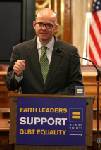 Harry Knox is director of the Religion and Faith Program at the Human Rights Campaign Foundation.
Harry Knox is director of the Religion and Faith Program at the Human Rights Campaign Foundation.
The dust is settling on the General Conference of the United Methodist Church, the quadrennial legislative meeting held April 23 – May 2 in Fort Worth.
I am heartbroken, as are my colleagues at the Human Rights Campaign, by the spiritual violence done to lesbian and gay people by the United Methodist Church, the denomination in which I once pastored, my parents were married, my nieces and nephews baptized, and out of which my beloved grandmother was buried last June. Delegates voted to retain language in the Discipline, the law book of the denomination, which says homosexuality “is incompatible with Christian teaching” and let stand a Judicial Council decision that allows local pastors to exclude individuals from membership – a gross departure from established practice in the denomination founded by John Wesley, who said, “If your heart beats with my heart give me your hand.”
But now that the lump in my throat has settled along with the dust, I’m taking a closer look at what happened at General Conference and seeing some opportunities I believe we advocates for GLBT justice should take advantage of.
In a typically schizophrenic way, the United Methodist Church called people like me sinners while also calling in a very clear and forceful way for protection of our civil rights. The denomination sees no irony there; it doesn’t recognize itself as abusive with its smack-hug behavior. But that is finally not as important to me as the fact that it’s pronouncements about our civil rights give LGBT-affirming people (there are many) within the denomination something positive to do between now and the next general conference in 2012 – namely, advocate in the name of the United Methodist Church for passage of a fully inclusive Employment Non-discrimination Act and Matthew Sheppard Hate Crimes Prevention Act.
In separate votes, the church committed itself to working for civil rights protections for LGBT people and explicitly rejected discrimination against transgender people, thanks to the prophetic personal witness of Rev. Drew Phoenix, the transgender pastor of St. John’s United Methodist Church in Baltimore. Therefore we expect and call on the Bishops of the United Methodists Church and local UMC pastors to speak out publicly in support of ENDA and the hate crimes bill. And have we at the Human Rights Campaign got a deal for them! There is no need for bishops or local clergy to wonder how to get involved. They can do so by being part of Clergy Call 2009.
Clergy Call 2009 is a year-long educational effort to facilitate faith-based mobilization within congregations and local communities. The effort builds on Clergy Call 2007, where the HRC Religion & Faith Program brought 230 religious leaders from all 50 states to Washington , D.C. Beginning this summer, HRC will support faith-based trainings throughout the country with a particular targeted emphasis on transgender education in 40 communities. The trainings will lead into the national Clergy Call event May 4-5, 2009 and will propel faith leaders to organize and advocate locally for GLBT equality.
Through the educational resources available through Clergy Call 2009, local church leaders can educate themselves and their parishioners about who transgender people are, their needs, and how to advocate for basic civil rights protections. Bishops of the Church can find the resources they need for being part of our massive lobby day on May 5, 2009 in which clergy will again engage members of Congress on behalf of their lesbian, gay, bisexual and transgender members and their families.
We will be reaching out to United Methodist clergy and their bishop shepherds to urge them to live into the clear call to advocacy issued by the General Conference. Please let us know at religion@hrc.org if you know of clergy – Methodist or not – who should be involved in Clergy Call 2009.
More from Beliefnet and our partners

